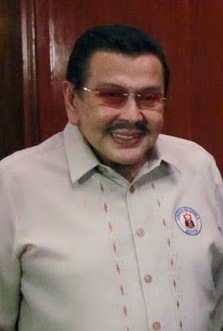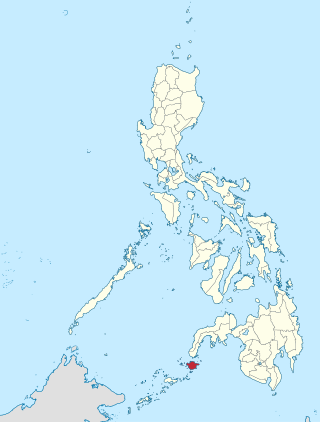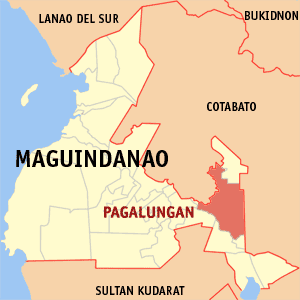Related Research Articles

The Moro Islamic Liberation Front is a group based in Mindanao seeking an autonomous region of the Moro people from the central government. The group has a presence in the Bangsamoro region of Mindanao, the Sulu Archipelago, Palawan, Basilan, and other neighbouring islands. The armed wing of the group was the Bangsamoro Islamic Armed Forces (BIAF), although the name of its parent organization, the MILF, was often used to refer to the BIAF. In July, 2018, the Philippine government passed the Bangsamoro Organic Law, giving more autonomy to Muslims. In return, MILF announced that it would disarm its 30,000 fighters.

Joseph Ejercito Estrada,, also known by the nickname Erap, is a Filipino politician and former actor. He served as the 13th president of the Philippines from 1998 to 2001, the 9th vice president of the Philippines from 1992 to 1998, and the 21st mayor of the City of Manila, the country's capital, from 2013 to 2019. In 2001, he became the first chief executive in Asia to be formally impeached and resigned from power. At the age of 85, he is currently the oldest living former Philippine President.
The Rizal Day bombings, also referred to as the December 30 bombings, were a series of bombings that occurred around Metro Manila in the Philippines on December 30, 2000. The explosions occurred within a span of a few hours. They caused 22 fatalities and around 100 non-fatal injuries.
2000 in the Philippines details events of note that happened in the Philippines in the year 2000.

The Moro conflict is an insurgency in the Mindanao region of the Philippines, which has involved multiple armed groups, and has been ongoing since March 1968. Peace deals have been signed between the Philippine government and two major armed groups, the Moro National Liberation Front (MNLF) and the Moro Islamic Liberation Front (MILF), but other smaller armed groups continue to exist.

This article covers the history of the current Philippine republican state following the 1986 People Power Revolution, known as the Fifth Philippine Republic.
The 2006 Central Mindanao bombings were a series of three bombings and one attempted bombing in Central Mindanao on October 10 and 11. Eight people were killed and between 30 and 46 were injured.
Terrorism is a major social issue in the Philippines and it is linked to the Moro conflict and the communist rebellion. The country ranks in 16th place on the Global Terrorism Index's 2022 list of countries most affected by terrorism.

The 2007 Basilan beheading incident was an armed incident in July 2007 between the Moro Islamic Liberation Front (MILF) rebels and the Philippine Army which led to the execution of 14 or 23 members of the Philippine Marines, amongst them 11 beheaded in the province of Basilan in the southern Philippines.

The presidency of Joseph Estrada, also known as the Estrada administration, spanned 31 months from June 30, 1998, to January 20, 2001. Estrada was elected president of the Philippines in the May 11, 1998 national elections, receiving almost 11 million votes.
The Bangsamoro Islamic Freedom Fighters (BIFF), also known as the Bangsamoro Islamic Freedom Movement, is an Islamist militant organization based in Mindanao, the Philippines. It is a smaller player in the overall Moro insurgency in the Philippines and is mostly active in Maguindanao and other places in central Mindanao. It is a breakaway group from the Moro Islamic Liberation Front founded by Ameril Umbra Kato. Following Kato's death, the group split into three factions, one of which has aligned with the Islamic State of Iraq and the Levant (ISIL), while the other two are less radical.
The Mamasapano clash was a shootout that took place during a police operation by the Special Action Force (SAF) of the Philippine National Police (PNP) on January 25, 2015, in Tukanalipao, Mamasapano, then-undivided Maguindanao. The operation, codenamed Oplan Exodus, was intended to capture or kill wanted Malaysian terrorist and bomb-maker Zulkifli Abdhir and other Malaysian terrorists or high-ranking members of the Moro Islamic Liberation Front (MILF).

The Bangsamoro Organic Law, also known as the Bangsamoro Basic Law (BBL), and officially designated as Republic Act No. 11054, is a Philippine law that provided for the establishment of the Bangsamoro Autonomous Region in Muslim Mindanao (BARMM).

Ahmad Akmad Usman y Batabol, more commonly known as Abdul Basit Usman, was a Filipino terrorist and a bomb-making expert who led the Special Operations Group of the Bangsamoro Islamic Freedom Fighters and had links to the Abu Sayyaf and Jemaah Islamiyah militant groups. Usman was on the United States' Rewards for Justice Program list, which offered $1 million for his capture.
Getulio Pascua Napeñas, Jr. is a Filipino politician and retired police officer who served as commander of the Philippine National Police Special Action Force (SAF) from 2013 until 2015. He is blamed for the ill-fated Mamasapano clash but earned praise as a man of principle and a true leader of the people.

The Battle of Camp Abubakar, codenamed Operation Terminal Velocity, was the final phase of the 2000 Philippine campaign against the Moro Islamic Liberation Front which resulted in the capture of Camp Abubakar al Siddique, stronghold of the Moro Islamic Liberation Front and its largest settlement, and seat of its Shariah-based government.

The 2000 Philippine campaign against the Moro Islamic Liberation Front was a military campaign conducted by the Armed Forces of the Philippines (AFP) against a Muslim secessionist group that took place during the presidency of Joseph Estrada in the Autonomous Region in Muslim Mindanao in the Philippines. The campaign was waged "to weaken the Moro Islamic Liberation Front's capability to undermine the territorial integrity of the Philippines and inflict harm on both government personnel and civilians".

The Battle of the Buliok Complex took place on 11 February 2003 in an area within the provinces of Maguindanao and Cotabato in Mindanao, Philippines. The 60-hectare complex, which stretches from Pikit, Cotabato to Pagalungan, Maguindanao, was a stronghold of the Muslim separatist Moro Islamic Liberation Front (MILF). Accused by the Philippine government of harboring members of Pentagon, a notorious kidnap-for-ransom gang operating in Mindanao, the MILF was attacked in the Buliok complex by the Armed Forces of the Philippines under orders from then-President Gloria Macapagal Arroyo.
The Philippines is one of the state opponents of the militant group, Islamic State of Iraq and the Levant (ISIL), more commonly referred to by the local media as the Islamic State of Iraq and Syria (ISIS).
This is a chronology of the Moro conflict, an ongoing armed conflict in the southern Philippines between jihadist groups such as the Abu Sayyaf Group, the Maute Group, Jemaah Islamiyah, and Islamic State affiliates, mainstream separatist groups such as the Moro Islamic Liberation Front (MILF), the Moro National Liberation Front (MNLF) and the Bangsamoro Islamic Freedom Fighters (BIFF), and the Philippine Government since 1971. Much of the fighting has been concentrated on the island of Mindanao and the Sulu archipelago, with spillover incidents and attacks occurring in the Philippine capital Manila and neighboring countries such as Malaysia.
References
- ↑ "Mindanao bombs: over 300 killed in 12 yrs". Rappler. Retrieved 2018-07-19.
- ↑ "44 die in Philippines bus bombs". Irish Times. 26 February 2000. Retrieved 4 August 2018.
- ↑ Cassman, Daniel. "Moro Islamic Liberation Front | Mapping Militant Organizations". web.stanford.edu. Retrieved 2018-07-19.
- ↑ "Barge blast death toll rises to 44 | Philstar.com". philstar.com. Retrieved 2018-07-19.
- ↑ "Bomb Aboard Bus Kills 26 in Philippines". Los Angeles Times . Archived from the original on 2012-10-23. Retrieved 2018-07-19.
- ↑ INQUIRER.net. "State of the Nation Address 2000: Joseph Ejercito Estrada | INQUIRER.net". sona.inquirer.net. Retrieved 2018-07-24.
- ↑ Nathaniel Melican (27 January 2015). "Estrada Stands by All-Out War Strategy vs MILF". Inquirer.Net. Retrieved 4 August 2018.